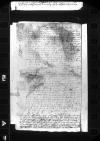Letter #3864
[Ioannes DANTISCUS] to Sigismund I JagiellonHeilsberg (Lidzbark Warmiński), 1539-03-03
English register:
Dantiscus expresses thanks for the favour shown to his subjects. He promises to make sure it does not become an example to others in future, and also to make his subjects more willing to pay tax.
In connection with news that a fleet is gathering for an unknown purpose on the Baltic, Dantiscus has advised the Gdańsk (Danzig) Town Council to secure the port. He asks the King to command them to do so as well.
Manuscript sources:
Prints:
| ||||||
Text & apparatus & commentary Plain text Text & commentary Text & apparatus
Serenissima
Humillimam perpetuae fidei et servitutis meae commendationem.
Pro ea vere regia in subditos meos beneficentia et gratia, qua revera hoc tempore summopere eguerunt, Serenissimae Maiestati Vestrae, quas possum, gratias habeo immortales. Et ne illa, ut Serenissima Maiestas Vestra mihi scribi cf.
Ceterum, quae nunc sunt tempora et quae in hominibus fides, rerum passim successus declarant. Defertur huc ad nos in
Cui me humillime commendo Deum Omnipotentem intime orans, ut eandem Serenissimam Maiestatem Vestram quam diutissime nobis felicissimam atque incolumem conservet.
Ex
[1 ] As the cf.
[2 ]
[3 ] Cf. cf.
